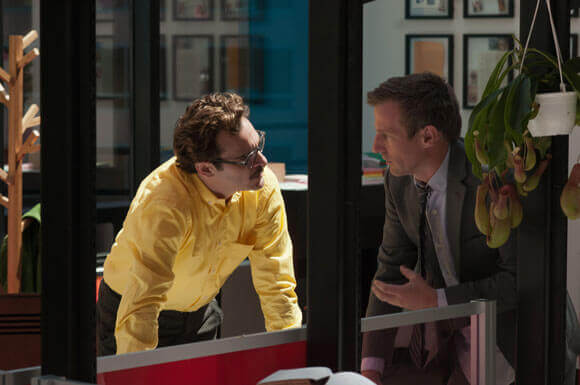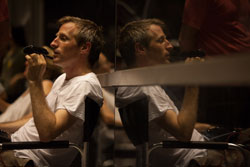
Spike Jonze (Where the Wild Things Are, Adaptation) delivers an unusual love story with Her starring Joaquin Phoenix, Amy Adams, Rooney Mara, Olivia Wilde, and Scarlett Johansson. Her‘s been included on numerous best films of 2013 lists (American Film Institute, National Board of Review, and the LA Film Critics) and is gaining Oscar momentum for the film’s director, screenplay, and lead actor (Phoenix). Unfortunately, Johansson has been ruled ineligible for her performance by the Hollywood Foreign Press so we won’t be seeing her name on the list of 2014 Golden Globe nominees. Why? Because she is never seen on screen.
Phoenix plays a man who falls in love with his computer operating system, and Johansson (who replaced Samantha Morton in post-production) provides the teasing, sexy voice of his love interest.
At the AFI Fest, Jonze took part in a Q&A in support of the Warner Bros Pictures release hitting theaters on December 18 2013.
On writing Her:
Spike Jonze: “Well, I wrote Where the Wild Things Are with Dave Eggers. This is the first script I had written on my own. It just felt right because it was something I’d been writing notes on over a few years as we were working on Where the Wild Things Are. It was just everything I was thinking about at the time.
I worked with Charlie Kaufman on a number of things. He’s been a good friend and my favorite writer, and one of the things he said one time was that he tries to approach a script to try to represent everything he’s thinking about at that moment in his life and put it in a screenplay. I was inspired by that and was trying to do that, in terms of relationships and our lives and the way we’re living our lives right now.”
On the inspiration for Her:
Spike Jonze: “More just a feeling, more that I’ve been thinking about things, trying to figure out things, questions I’m thinking about.”
On creating the characters:
Spike Jonze: “I think with Samantha, I really liked the idea of trying to empathize with her and understand what her experience would be. One of the things that Scarlett Johansson and I were talking a lot about was the idea that when we first started working on it together, I was in New York and she came over and we read a bunch of scenes. One of the things I was saying to her was when Samantha was created, she doesn’t have any fears or doubts or insecurities or baggage. Like we are, and we learn those. We learn self-doubts and we learn those things. I think it was at that point she was like, ‘Okay, this is going to be hard. This is going to be harder than I thought it was going to be, to try to unlearn those things.’”
On recording Scarlett Johansson’s voice work:
Spike Jonze: “Actually when we shot, we initially had cast Samantha Morton as the character Samantha. Samantha was really involved in giving Joaquin a lot to work from. Then when we got into editing, we had realized that what Samantha and I had done together wasn’t working for what the character needed, and so we ended up having to recast at that point.”
On creating the look of Her:
Spike Jonze: “I think one of the things we decided early on when we were starting to design the look of the movie, especially when K.K. Barrett – our production designer – came on and Casey Storm, when Casey and K.K. came on, one of the things we decided early on is that we weren’t trying to make a future movie, like a predictive movie, like, ‘This is what the future is going to look like.’ We started going down that road and hit all the techie things that are going to happen with monitors in glass and panes of glass, what Corning glassware is doing. It didn’t seem that relevant to our movie and we let go of all that stuff.
I think the idea was to try to make this more seemingly utopic feeling, all soft materials and warm colors and woods. Kind of the idea of in L.A. it’s a pretty nice place to live, outside of traffic, but we have subways that work really well. The weather’s amazing, the mountains are there, the ocean is there, there’s great food, great coffee everywhere. Everything’s nice and easy, especially with technology the way it’s making our lives easier. We wanted to make a movie that felt like that, so the wardrobe felt like that and that’s Casey finding the fabrics and colors.
Even in a world that seems like you should have everything to make your life nice, there’s still sort of aloneness and isolation that I think is maybe true. There’s something that feels contemporary about that and also specifically feels like L.A. about that.”
On coming up with the score:
Spike Jonze: “The music’s done by Arcade Fire. They were working on that record as they were working on this so it was interesting. Win [Butler] and I started talking about the score about two years ago. It kind of seemed like the record informed the soundtrack and the soundtrack informed the record a little bit. There’s a song on the record, the last one, called ‘Supersymmetry’ that he wrote for the movie, but then sort of became something else.
I think what Win and I started talking about in the beginning was just that we wanted the soundtrack to have this electricity to it, a current to it, but not to be electronic and not to use synthesizers at all, not to feel synthetic but to feel handmade but still have an electricity to it, and also just to play a sort of romance and love story and longing of Theodore.”

On casting actors against type:
Spike Jonze: “Actually, I guess sometimes I didn’t think they were cast against type but I guess I was trying to cast them for aspects that I felt is their essence. With Joaquin, the reason I kept wanting to work with him is just because I think he’s an amazing actor and he’s so alive and holds the camera in this incredible way in his movies. His choices are so surprising and so authentic, and also because I was thinking of who could actually hold the camera that way, because his performance has to sort of represent both of the characters on screen since she’s not physically represented. I was thinking I didn’t know if he was going to be… I mean, I thought he’d be amazing. He’s an amazing actor, but was he going to be Theodore?
So I met with him the week after I finished the script. I sent Megan [Ellison, producer] the script and went and met with Joaquin and I just instantly felt this, because I’d met him over the years a little bit but I didn’t really get a sense of him, and when I talked with him I saw how playful he was and he’s somebody that as seriously as he takes his work, he doesn’t take himself seriously at all. Within the first five minutes watching him I realized I wasn’t even listening to what he was saying. I was just smiling, ‘Wow, absolutely, really, that’s interesting.'”
On the rehearsal process:
Spike Jonze: “We rehearse a lot. The process usually though is just reading the script and the scenes together over and over and talking about it, not really acting it. Not trying to cement it in this scene has to be played this way. I think with Joaquin, when he’s excited about a scene, he doesn’t know how to play it. When the scene is written, ‘This is how to play it and this is the one way it’s supposed to go and there’s no other possibilities,’ I think the scene feels dead to him.
But when he’s reading a scene and he starts to imagine all the different possibilities and he doesn’t know what this scene is exactly, but he knows it has a lot of different ways it can go, that’s when he gets excited about a scene. He’s not playing the scene like, ‘Oh, this is the scene that’s about… This scene he’s apologizing and that’s what the scene’s about.’ I think if it comes to that, then that almost makes him anxious and he shuts down. When the scene has possibilities to be anything, go anywhere, it can be an apology but it could be also a tension to it or an uncertainty of how he’s going to get accepted. Some complex thing happening that makes the apology.”
On deciding on the look of the future Los Angeles:
Spike Jonze: “We actually collaged Shanghai and LA together to make this future L.A. K.K. Barrett, our production designer, it was a lot of location scouting both here in L.A. and Shanghai to find this exact thing. Then of course going into spaces, going into the office where we built the lettering office in a building, what he did in there. There was actually a photographer named Rinko Kawauchi, a Japanese photographer who Hoyte [Van Hoytema], our cinematographer, and I had obsessed on his book because the photos have this real softness but real bright colors, blown out and white but then real strong hints of pink or pale blue. I think that became a reference for the romantic quality of the photography we were going for.”






